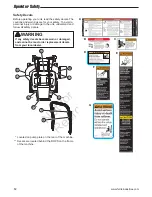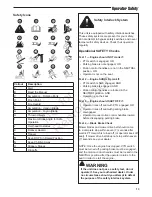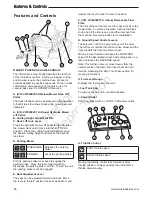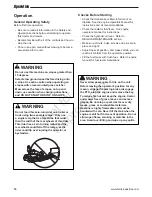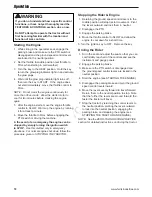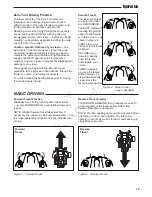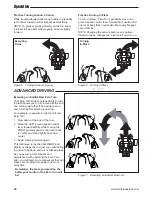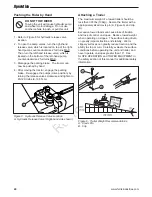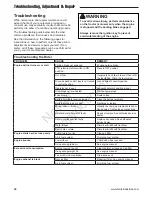
Not for
Reproduction
26
www.ferrisindustries.com
Operation
WARNING
Never store the unit, with diesel fuel in engine
or fuel tank, in a heated shelter or in enclosed,
poorly ventilated enclosures. Diesel fumes
may reach an open flame, spark or pilot light
(such as a furnace, water heater, clothes dryer,
etc.) and cause an explosion.
Handle diesel fuel carefully. It is highly
flammable and careless use could result in
serious fire damage to your person or property.
Drain fuel outdoors into an approved container
and away from open flame or sparks.
Storage
Temporary Storage (30 Days Or Less)
Remember, the fuel tank will still contain some fuel, so
never store the unit indoors or in any other area where
fuel vapor could travel to any ignition source. Fuel vapor
is also toxic if inhaled, so never store the unit in any
structure used for human or animal habitation.
Here is a checklist of things to do when storing your unit
temporarily or in between uses:
• Keep the unit in an area away from where children
may come into contact with it. If there’s any chance
of unauthorized use remove the ignition key.
• If the unit can’t be stored on a reasonable level
surface, chock the wheels.
• Clean all grass and dirt from the mower.
• If temperature is expected to drop below 35 degrees,
refer to Long Term Storage, Item 2.
Long Term Storage (Longer Than 30 Days)
Before you store your unit for the off-season, read the
Maintenance and Storage instructions in the Safety
Rules section, then perform the following steps:
1. Drain crankcase oil while engine is hot and refill with
a grade of oil that will be required when unit is used
again.
2. Use an Antifreeze tester to check the cooling
system’s level of protection. Read the instructions on
the Antifreeze container for the appropriate ratio of
water to Antifreeze for your geographical area.
3. Prepare the mower deck for storage as follows:
a. Remove mower deck from the unit.
b. Clean underside of mower deck.
c. Coat all bare metal surfaces with paint or light
coat of oil to prevent rusting.
4. Clean external surfaces and engine.
5. Prepare engine for storage. See engine owner’s
manual.
6. Clean any dirt or grass from cylinder head, engine
housing and air cleaner element.
7. Cover air cleaner and exhaust outlet tightly with
plastic or other waterproof material to keep out
moisture, dirt and insects.
8. Completely grease and oil unit as outlined in the
Regular Maintenance section.
9. Clean up unit and apply paint or rust preventative to
any areas where paint is chipped or damaged.
10. Be sure the battery is filled to the proper level
with water and is fully charged. Battery life will be
increased if it is removed, put in a cool, dry place and
fully charged about once a month. If battery is left in
unit, disconnect the negative cable.
11. Drain fuel system completely or add a diesel fuel
stabilizer to the fuel system. If you have chosen to
use a fuel stabilizer and have not drained the fuel
system, follow all safety instructions and storage
precautions in this manual to prevent the possibility
of fire from the ignition of diesel fumes. Remember,
diesel fumes can travel to distant sources of ignition
and ignite, causing risk of explosion and fire.
NOTE: Diesel fuel, if permitted to stand unused for
extended periods (30 days or more), may develop
gummy deposits which can adversely affect the fuel
pump and injector tubes and cause engine malfunction.
To avoid this condition, add a diesel fuel stabilizer to the
fuel tank and run the engine a few minutes, or drain all
fuel from the unit before placing it in storage.
Starting After Long Term Storage
Before starting the unit after it has been stored for a long
period of time, perform the following steps.
1. Remove any blocks from under the unit.
2. Install the battery if it was removed.
3. Unplug the exhaust outlet and air cleaner.
4. Fill the fuel tank with fresh fuel. See engine manual
for recommendations.
5. See engine owner’s manual and follow all instructions
for preparing engine after storage.
6. Check crankcase oil level and add proper oil if
necessary. If any condensation has developed
during storage, drain crankcase oil and refill.
7. Inflate tires to proper pressure. Check fluid levels.
8. Start the engine and let it run slowly. DO NOT run
at high speed immediately after starting. Be sure
to run engine only outdoors or in well ventilated
area.
Diesel Fuel Recommendations
Fuel companies provide fuel tailored to meet the existing
weather conditions. These fuels change at the start of
the predominant season according to regional weather
trends.
Winter fuels are tailored to give ease of starting for cold
weather. Summer fuel may be somewhat heavier than
winter fuel resulting in slightly better fuel economy and
power. Spring and fall fuel is an average blend between
winter and summer blend.
For these reasons an effort should be made to purchase
fuels in such quantities that they are not carried over
into the next season. Using the wrong blend of fuel can
cause problems with the engine.
Refer to the engine manufacturer’s manual for specific
fuel recommendations.

